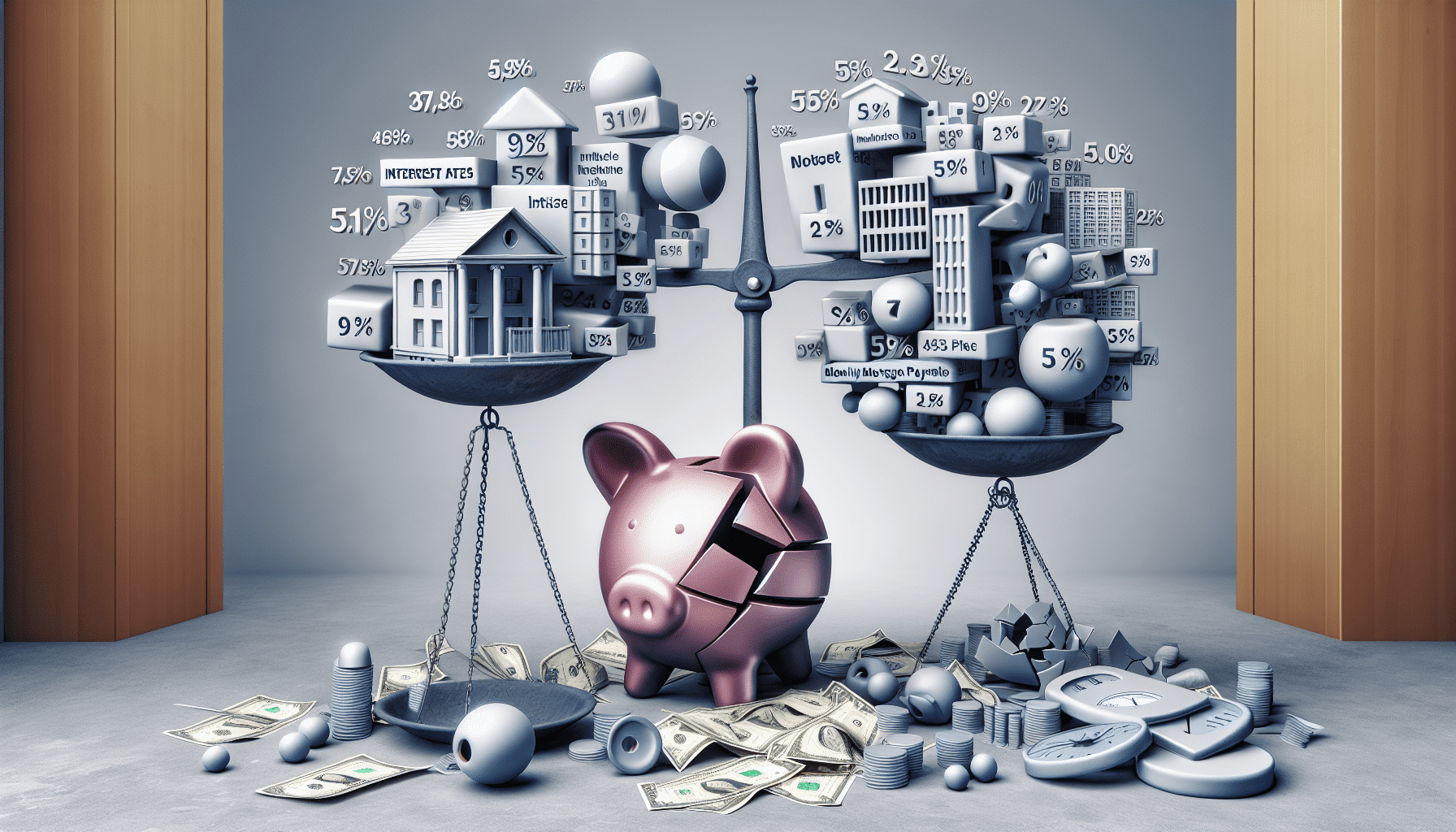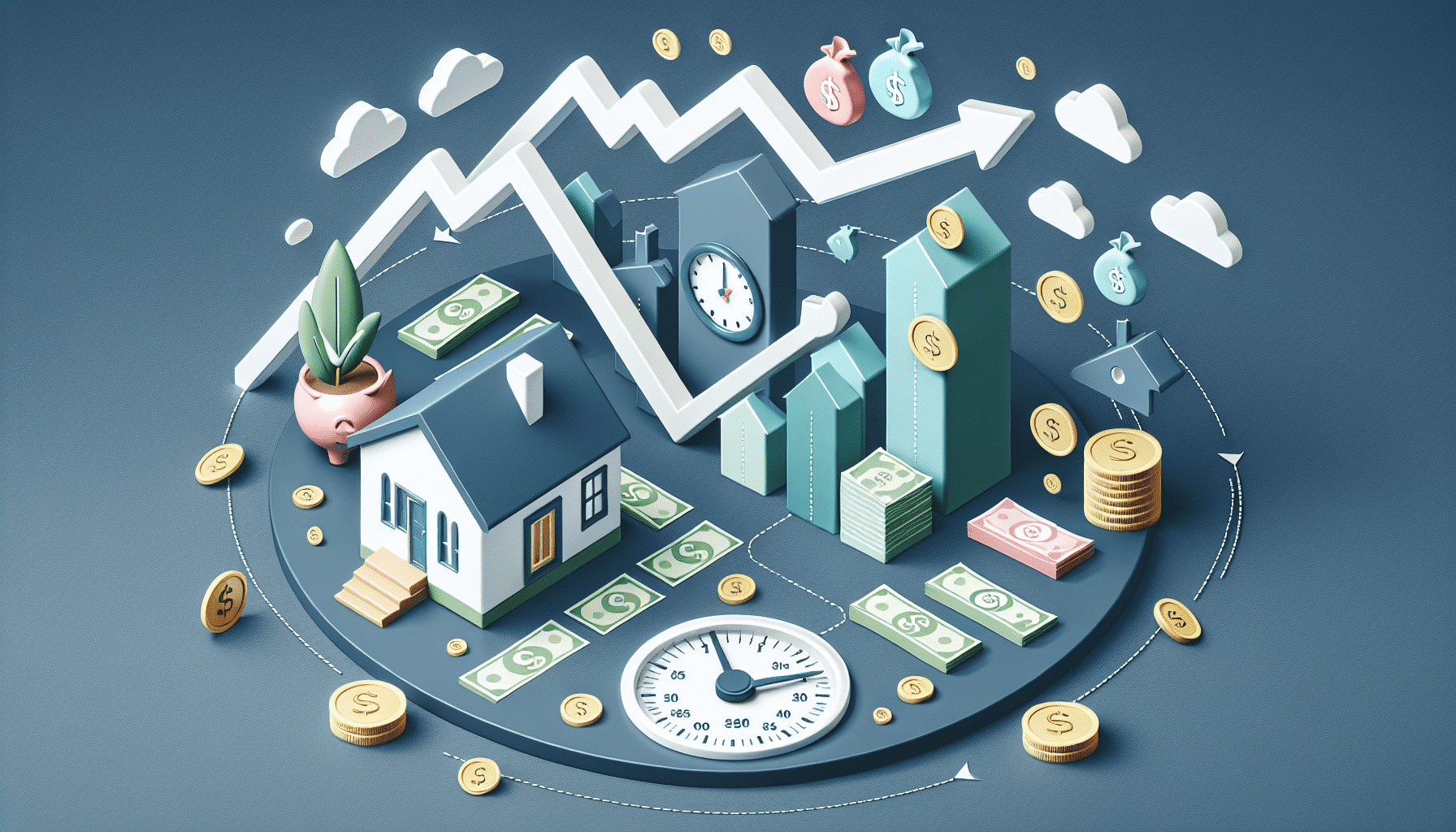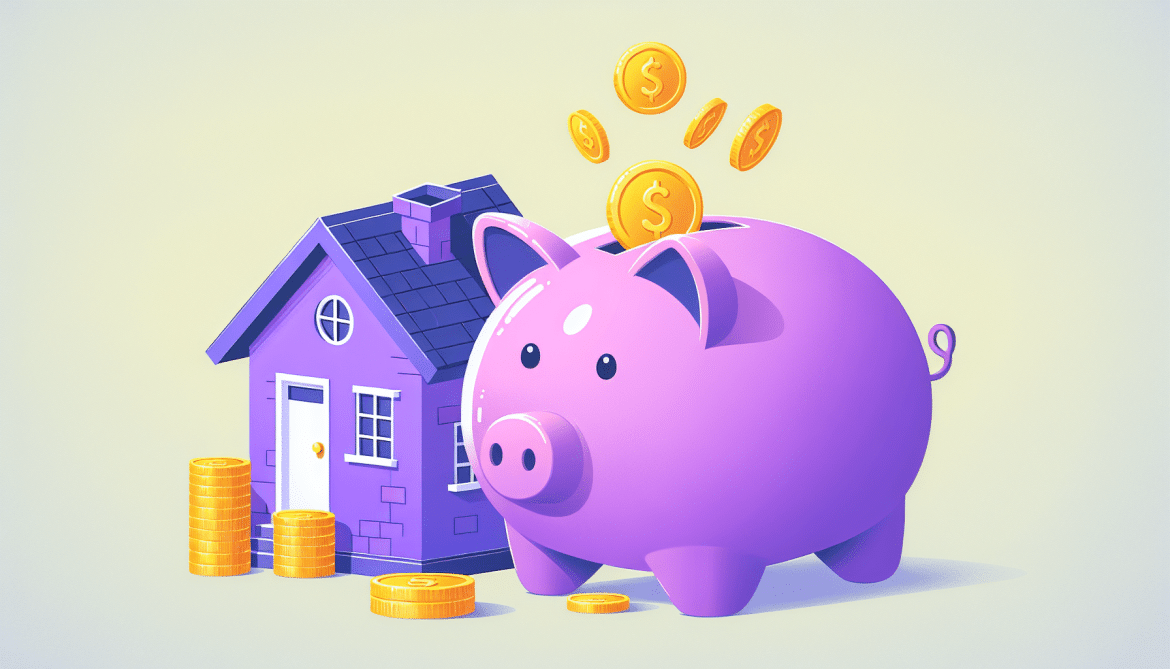Are you dreaming of owning your own home? Saving for a home loan may seem like a monumental task, but understanding the impact of interest rates is key to achieving your goal. Interest rates play a crucial role in determining how much you can save for your dream home. Whether you are just starting your savings journey or already have a substantial amount set aside, it is essential to take into account how changes in interest rates can affect your savings plans. In this article, we will explore the relationship between interest rates and saving for a home loan, providing you with valuable insights to help you make informed financial decisions.
Understanding Interest Rates
Definition of interest rates
Interest rates refer to the cost of borrowing money or the return on investment for lenders. It is usually expressed as a percentage and represents the price of borrowing or lending funds. Essentially, it is the cost of using someone else's money for a specified period of time.
Types of interest rates
There are several types of interest rates that individuals encounter in various financial transactions. These include:
-
Fixed interest rates: This type of interest rate remains constant over the entire term of the loan. It provides borrowers with certainty as their monthly payments remain stable.
-
Variable interest rates: Variable interest rates, on the other hand, fluctuate based on the prevailing market conditions. These rates are often tied to a benchmark, such as the prime rate, and can change over time.
-
Prime interest rate: The prime rate is the rate that banks offer to their most creditworthy customers. It serves as a reference point for various types of loans, including mortgages.
Factors influencing interest rates
Interest rates are influenced by several factors, including:
-
Inflation: When inflation rises, lenders typically increase interest rates to counteract the decrease in purchasing power.
-
Central bank policies: Monetary policies set by central banks can impact interest rates. For example, when central banks want to stimulate economic growth, they may lower interest rates to encourage borrowing and spending.
-
Economic growth and unemployment rates: Strong economic growth and low unemployment rates often result in higher interest rates as demand for borrowing increases.
Importance of Saving for a Home Loan
Advantages of saving for a home loan
Saving for a home loan offers numerous advantages, such as:
-
Down payment: By saving for a home loan, you can accumulate a sufficient down payment. A larger down payment can reduce the loan amount, lower monthly payments, and enable you to secure better interest rates.
-
Lower loan-to-value ratio: Saving for a home loan helps you maintain a lower loan-to-value ratio (LTV), which is the ratio between the loan amount and the appraised value of the property. A lower LTV can result in more favorable loan terms and lower borrowing costs.
-
Financial stability: Saving for a home loan demonstrates financial responsibility and discipline. This can contribute to greater stability and resilience when faced with unexpected expenses or economic downturns.
Building equity through saving
When saving for a home loan, each contribution you make increases your equity. Equity refers to the portion of the property that you actually own, and it grows as you make mortgage payments and property values appreciate. Building equity is crucial as it creates a financial asset that can be tapped into for future borrowing or investment opportunities.
Avoiding excessive debt burden
By saving for a home loan, you can reduce the risk of taking on an excessive debt burden. When individuals borrow beyond their means, they may struggle to meet their monthly mortgage payments, leading to financial stress and potential foreclosure. Saving allows you to assess your financial capabilities and budget accordingly to avoid these risks.
Improving credit score
By consistently saving and demonstrating financial responsibility, individuals can improve their credit score. A higher credit score increases the chances of securing a lower interest rate on a home loan. Lenders view borrowers with higher credit scores as less risky, and therefore offer more favorable terms. Saving for a home loan not only helps fund a down payment but also enhances your creditworthiness in the eyes of lenders.
Impact of Interest Rates on Saving
Higher interest rates increase borrowing costs
When interest rates are high, the cost of borrowing money increases. This directly impacts the amount of money you will ultimately pay back on a home loan. Higher interest rates result in higher monthly mortgage payments, making homeownership more expensive and potentially limiting your affordability.
Lower interest rates decrease borrowing costs
On the other hand, lower interest rates decrease the cost of borrowing money. With lower rates, borrowers can secure mortgages at more favorable terms and lower monthly payments. This can significantly reduce the overall cost of homeownership and increase affordability.
Effect on monthly mortgage payments
Interest rates have a significant impact on monthly mortgage payments. When interest rates are high, the monthly payments on a mortgage are higher as well. Conversely, lower interest rates result in lower monthly payments. This can play a crucial role in determining the affordability of a home loan and the long-term financial commitment.
Strategies for Saving in a Changing Interest Rates Environment
Monitor interest rate trends
To effectively save in a changing interest rate environment, it is crucial to monitor interest rate trends. Stay informed about the current rates and keep an eye on any potential changes. This will allow you to make informed decisions regarding your savings goals and loan options.
Adjust saving goals accordingly
As interest rates fluctuate, it may be necessary to adjust your saving goals. Higher interest rates may require a larger down payment to offset the increased borrowing costs. Evaluate your financial situation regularly and make adjustments to your savings plans accordingly.
Consider refinancing options
When interest rates drop significantly, you may consider refinancing your existing home loan. Refinancing allows you to replace your original mortgage with a new one at a lower interest rate, potentially reducing your monthly payments and overall borrowing costs. Consult with a financial advisor or mortgage specialist to evaluate the benefits of refinancing in your specific scenario.
Consult with financial advisors
In a changing interest rate environment, seeking advice from financial advisors can be valuable. They can provide guidance on savings strategies, investment opportunities, and loan options tailored to your financial goals and market conditions. Utilize their expertise to make informed decisions and navigate the complexities of interest rate fluctuations.

Effects of Economic Factors on Interest Rates
Inflation and its impact on interest rates
Inflation is a key economic factor that influences interest rates. When inflation rises, lenders adjust their interest rates to maintain their purchasing power. Lenders require higher interest rates to compensate for the decrease in the value of money over time. Therefore, inflation often leads to higher interest rates, making borrowing more expensive.
Central bank policies and interest rates
Central banks play a vital role in influencing interest rates through their monetary policies. By adjusting benchmark rates, such as the federal funds rate in the United States, central banks can indirectly influence borrowing costs for individuals. Lowering interest rates stimulates economic growth, while raising rates can help curb inflationary pressures.
Economic growth and unemployment rates
Economic growth and unemployment rates also impact interest rates. During periods of strong economic growth and low unemployment rates, borrowing demand increases. This higher demand often results in higher interest rates. Conversely, weak economic growth and high unemployment rates can lead to lower interest rates as borrowing demand decreases.
Long-Term vs. Short-Term Impact of Interest Rates
Understanding the impact over the loan term
Interest rates have both short-term and long-term impacts on home loans. In the short-term, an increase in interest rates can make monthly mortgage payments more expensive. However, over the long-term, the impact can be more significant. Higher interest rates mean paying more interest over the life of the loan, increasing the total cost of homeownership.
Effects on initial down payment
Interest rates can also affect the amount required for the initial down payment. When rates are higher, lenders may require a larger down payment to mitigate risks associated with higher borrowing costs. Conversely, lower interest rates may enable borrowers to make a smaller down payment, reducing the upfront financial commitment.
Considering variable or fixed interest rate loans
Homebuyers have the option to choose between variable or fixed interest rate loans. Understanding the potential impact of interest rates is crucial when making this decision. Fixed-rate mortgages provide stability as the rate remains constant over the loan term, protecting borrowers from rising rates. Variable-rate mortgages, however, may offer lower initial rates but are subject to fluctuations based on market conditions.
Mitigating the Impact of High Interest Rates
Increasing down payment to reduce loan amount
One effective way to mitigate the impact of high interest rates is by increasing the down payment. By reducing the loan amount, the overall interest paid over the life of the loan decreases. A larger down payment also improves the loan-to-value ratio, potentially leading to more favorable loan terms and lower monthly payments.
Improving credit score to negotiate lower rates
A higher credit score often enables borrowers to negotiate lower interest rates. By improving your credit score before applying for a home loan, you increase your chances of securing a lower interest rate. Making timely payments, reducing debts, and maintaining a low credit utilization ratio can contribute to an improved credit score.
Exploring government assistance programs
Government assistance programs can also help mitigate the impact of high interest rates. These programs, such as FHA loans in the United States, provide more flexible eligibility criteria and lower down payment requirements. By utilizing these programs, borrowers can access more affordable financing options, even in a high interest rate environment.
The Role of Mortgage Brokers and Lenders
Comparison shopping for the best rates
Mortgage brokers and lenders play a crucial role in helping borrowers obtain competitive interest rates. By shopping around and comparing rates from different lenders, you can find the most favorable terms for your specific needs. Mortgage brokers can assist in the process by leveraging their network of lenders to find the best rate and loan options available.
Understanding loan terms and conditions
Mortgage brokers and lenders can also help you understand the terms and conditions of various loan options. They can explain the intricacies of interest rates, repayment schedules, and any fees or penalties associated with the loan. This understanding is vital in making informed decisions and avoiding potential pitfalls.
Negotiating interest rates with lenders
Mortgage brokers and lenders can also assist in negotiating interest rates. Their knowledge of the industry and relationships with lenders can give them the leverage to secure more favorable rates on your behalf. By utilizing their expertise, you can potentially save on borrowing costs and find a loan that aligns with your financial goals.

Investing or Saving: What's the Best Approach?
Considering investment opportunities
When deciding between investing and saving for a home loan, it is essential to consider investment opportunities. Investing in the stock market, bonds, or real estate can potentially yield higher returns than a standard savings account. However, investing comes with risks, and it is crucial to assess your risk tolerance and financial goals before making decisions.
Balancing saving and investing goals
While investing may offer lucrative opportunities, it is important to strike a balance between saving for a home loan and investing for other financial goals. For many individuals, homeownership represents a long-term investment in itself. By allocating a portion of their savings towards a down payment, they can build equity and create a stable financial foundation for the future.
The Importance of Long-Term Financial Planning
Setting realistic saving goals
Long-term financial planning plays a critical role in achieving homeownership. By setting realistic saving goals, you can create a roadmap to save for a home loan over an extended period. Understand your financial capabilities, evaluate your expenses, and establish a budget that aligns with your goals.
Creating a budget
Creating a detailed budget is vital in managing your finances effectively and saving for a home loan. Track your income, expenses, and savings, and allocate funds accordingly. A well-structured budget can help prioritize saving for a down payment and ensure that you stay on track towards homeownership.
Considering the opportunity cost of saving
It is essential to consider the opportunity cost of saving for a home loan. Saving for a down payment requires discipline and may mean sacrificing other short-term goals or luxuries. Consider the trade-offs and weigh the benefits of homeownership against other financial aspirations to make an informed decision.
In conclusion, understanding interest rates and their impact on saving for a home loan is crucial for individuals aspiring to become homeowners. Factors such as inflation, central bank policies, and economic indicators influence interest rates. Saving for a home loan offers several advantages, including the accumulation of a down payment, building equity, and improving credit score. Interest rates significantly impact borrowing costs and monthly mortgage payments. Strategies for saving in a changing interest rate environment include monitoring trends, adjusting saving goals, considering refinancing options, and consulting with financial advisors. Economic factors such as inflation, central bank policies, and economic growth influence interest rates. It is important to understand the long-term and short-term impact of interest rates, as well as how to mitigate the impact of high rates. Mortgage brokers and lenders play a vital role in securing competitive rates and negotiating on behalf of borrowers. The decision between investing and saving for a home loan should be based on individual circumstances and financial goals. Long-term financial planning, setting realistic goals, creating a budget, and considering opportunity costs are essential components of achieving homeownership and creating a solid financial foundation.




